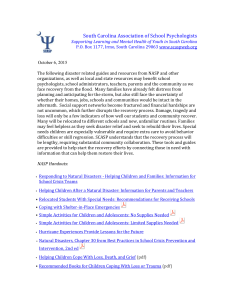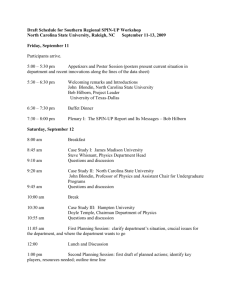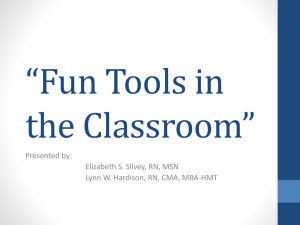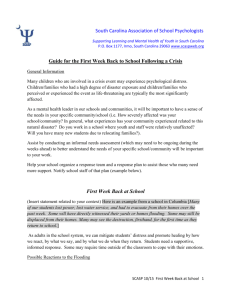a - Institute for Disaster Studies
advertisement
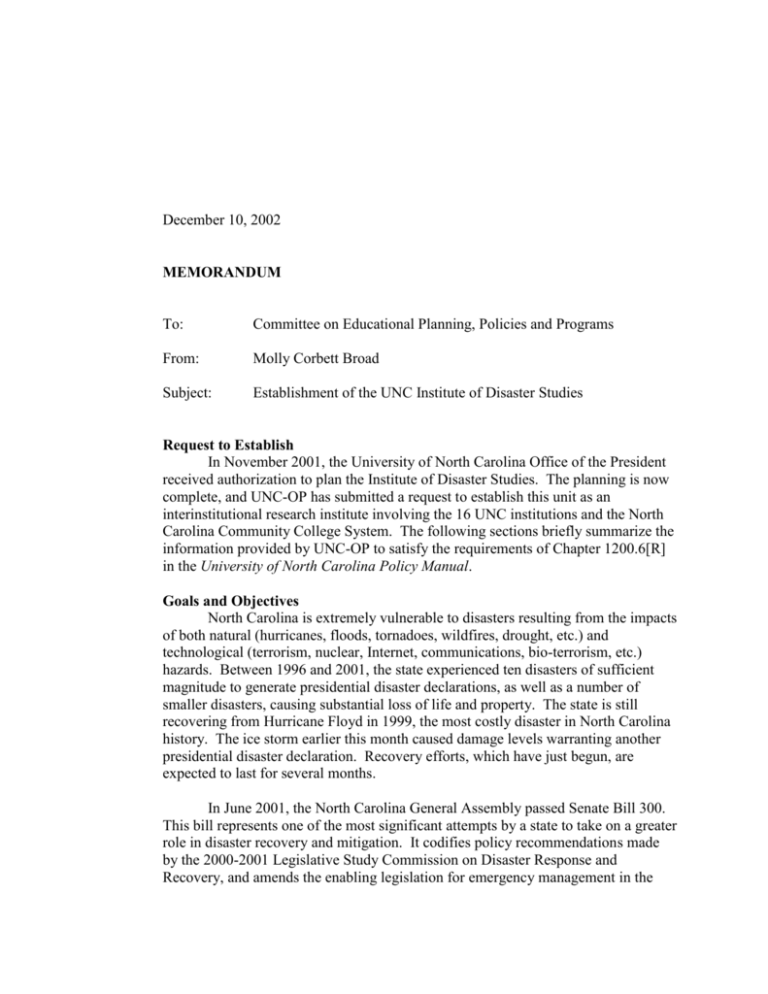
December 10, 2002 MEMORANDUM To: Committee on Educational Planning, Policies and Programs From: Molly Corbett Broad Subject: Establishment of the UNC Institute of Disaster Studies Request to Establish In November 2001, the University of North Carolina Office of the President received authorization to plan the Institute of Disaster Studies. The planning is now complete, and UNC-OP has submitted a request to establish this unit as an interinstitutional research institute involving the 16 UNC institutions and the North Carolina Community College System. The following sections briefly summarize the information provided by UNC-OP to satisfy the requirements of Chapter 1200.6[R] in the University of North Carolina Policy Manual. Goals and Objectives North Carolina is extremely vulnerable to disasters resulting from the impacts of both natural (hurricanes, floods, tornadoes, wildfires, drought, etc.) and technological (terrorism, nuclear, Internet, communications, bio-terrorism, etc.) hazards. Between 1996 and 2001, the state experienced ten disasters of sufficient magnitude to generate presidential disaster declarations, as well as a number of smaller disasters, causing substantial loss of life and property. The state is still recovering from Hurricane Floyd in 1999, the most costly disaster in North Carolina history. The ice storm earlier this month caused damage levels warranting another presidential disaster declaration. Recovery efforts, which have just begun, are expected to last for several months. In June 2001, the North Carolina General Assembly passed Senate Bill 300. This bill represents one of the most significant attempts by a state to take on a greater role in disaster recovery and mitigation. It codifies policy recommendations made by the 2000-2001 Legislative Study Commission on Disaster Response and Recovery, and amends the enabling legislation for emergency management in the state. The Commission recommended that the University of North Carolina and the North Carolina Community College System study the need for, and feasibility of, creating an Institute of Disaster Studies in North Carolina. With the assistance of a Special Projects Grant from the Economic Development Initiative of the U.S. Department of Housing and Urban Development, an inter-university committee was convened in 2002 to study the feasibility of creating an Institute of Disaster Studies in North Carolina. The committee included faculty from seven UNC institutions — East Carolina University, Elizabeth City State University, NC State University, UNC-Chapel Hill, UNC Charlotte, UNC Wilmington, and Western Carolina University — as well as administrators from the North Carolina Community College System and officials from the North Carolina Division of Emergency Management. After thoroughly researching the issues of need and feasibility, the committee recommended the creation of the Institute of Disaster Studies to coordinate, prepare, and disseminate research findings to public officials and citizens. The broad goals of the institute will be to: Support, facilitate, conduct, coordinate, and disseminate research on planning for preparation, response, management, recovery, and mitigation from disasters caused by natural, technological, and terrorist hazards. Serve as the state's clearinghouse for technical information and training on disaster mitigation. Amplify university activities relative to community assistance such as forecasting technologies, flood mapping, evacuation planning, severe weather warning, and atmospheric interactions with the land and people. Advise and assist local, state, and federal response, recovery, and mitigation teams following a disaster, and collect critical information for future analysis. The institute will be devoted to the creation of knowledge and the transfer of practical intelligence that will mitigate against losses of life and property that are attributable to disasters of natural, technological, or terrorist origin. The actual transfer of intelligence will include that originated by the institute, as well as that accumulated from other sources. The primary recipients of this knowledge will be those North Carolina citizens, students, elected officials, and practicing professionals in both the public, private, and non-profit sectors who are interested in, involved in, or who must cope with the risk of disasters. The institute will engage in disaster research, disaster instruction, and disaster planning assistance. The research program will be composed of both basic and applied components. The instructional program will be composed of both credit and non-credit components for students and professionals alike. The assistance program will include short-term support to state and local agencies coping with an existing disaster and its aftermath as well as on-going support in the preparation of mitigation policies and plans at state and community levels. Within each of these programs of activity, close cooperation with the Federal Emergency Management Agency (FEMA), the North Carolina Division of Emergency Management (DEM), and local disaster management officials is crucial to success. Relevance to Institutional Mission; Relationship with Existing Academic Units The institute will build on the strengths of existing academic, research, extension, and outreach units in North Carolina’s public university institutions and community colleges. It will bring together multiple disciplines to complement and further advance the University’s historic three-part mission of research, teaching, and public service. Many existing academic departments and centers will be associated with the institute as faculty pursue disaster-related research projects and as faculty, staff, and students bring knowledge gathered by the institute on disaster preparedness and hazard mitigation to elected officials, professionals, and citizens through seminars and outreach activities. The institute will offer major seminars, symposia, and targeted workshops on specific hazard issues. Audiences will include leaders at all levels of the emergency preparedness systems: first responders, planners, elected officials, nonprofit organizations, and emergency managers. The institute will attract visiting faculty and researchers from throughout the United States and beyond, and will have substantial impact on work being conducted in the nation as well as in North Carolina. The institute's outreach program will be closely coordinated with the North Carolina Cooperative Extension Service and with the Community College program. The University and community college systems operate or provide administrative support to a number of existing centers, programs, and initiatives that would lend themselves to the broader work of the institute. Academic departments and centers likely to be involved in various educational, research, and outreach activities of the institute include Agriculture and Natural Resources, Civil Engineering, Criminal Justice, Earth Sciences, Economics, Education, Emergency Management, Engineering Technology, Geography, Information Technology, Political Science, Public Health and Health Administration, Urban and Regional Planning, Sociology, State Climate Office of NC, and Transportation. Anticipated Effects on Instructional Programs The institute will engage in an integrated program of instruction based upon its own research inventory as well as the accumulation of knowledge and best practices that result from the institute’s specialized library of disaster research literature. Instructional activities of the institute will take advantage of current distance learning technologies whenever effective. Instructional activities will involve traditional university credit-bearing courses as well as non-credit courses designed for both technical and managerial positions within the disaster response, recovery, and mitigation functions. The institute expects to have a major, positive impact on a range of instructional programs throughout the University and community college systems. The institute will offer opportunities for faculty teaching enhancement, faculty research initiatives, technology transfer, and participation by both graduate and undergraduate students from the 16 institutions in the University and for students in the state’s community colleges. Opportunities will include access to, and interactions with, both government and private sector leaders who visit the institute, research assistantships, student internships, partnerships, mini-grants for faculty curriculum development, and participation in the institute’s teleconferences, seminars, symposia, crisis management exercises, and other activities and initiatives sponsored, organized, or promoted by the institute. Administrative Structure The institute's Director will be appointed by the President of the University of North Carolina in consultation with the Governor and the President of the North Carolina Community College System. The Director will have university research experience, a track record of publications in the field of disaster mitigation, a national reputation for obtaining sponsored support in disaster research, and experience in working with public, governmental, and private stakeholders. Two boards will be appointed to support the work of the institute. A seven-member Policy Advisory Board, consisting of nationally recognized mitigation experts and representatives of public and private stakeholder organizations including the University of North Carolina and North Carolina Community College System, will provide broad programmatic guidance for the institute. A 12-member Technical Advisory Board, consisting of nationally recognized mitigation experts, public officials, and emergency management professionals, will provide specific guidance regarding the institute’s activities. Budget and Anticipated Sources of Funding The institute’s first-year budget, covering personnel, operations, and research expenses, is expected to be $1,000,000. The expected budget for year two and beyond is approximately $935,000 annually. The institute will seek annual base funding in these amounts from the state of North Carolina. The institute also will seek multi-institutional grants and contracts from corporate, foundation, and government sponsors to augment its programs and activities. The institute’s Director, in consultation with the Policy and Technical Advisory Boards, will develop a five-year funding model that demonstrates continued development of external funding sources to expand the programmatic and outreach activities of the institute. The institute will work closely with the North Carolina Division of Emergency Management, North Carolina Community College System, and North Carolina Sea Grant to coordinate efforts on sponsored projects to leverage state resources. Based on the experience of other hazard centers around the country, it is anticipated that corporate, government and non-profit contributors will be identified and cultivated to provide long-term financial support for the institute. The institute expects to supplement its base funding by vigorously pursuing support for its research and information transfer projects from public and private entities. Likely federal sponsors of projects might include the National Science Foundation, National Oceanic and Atmospheric Administration, Department of Justice, Department of Energy, Federal Emergency Management Agency, Environmental Protection Agency, Office of Homeland Security, Department of Transportation, and others. Private sponsors might include the Ford Foundation, John D. and Catherine T. MacArthur Foundation, Golden Leaf Foundation, Doris Duke Charitable Foundation, Z. Smith Reynolds Foundation, or Mary Reynolds Babcock Foundation. The institute’s grant program will be used to fund start-up instructional, outreach, and research programs and to leverage external funding sources that require matching funds. The success of the institute will hinge on its ability to leverage the state's financial investment to secure additional research and outreach funding that will help protect the people and economy of North Carolina from future disasters. The longterm strategic plan for the institute will ultimately determine the appropriate balance between state and external funding, but it is common for such institutes to have a four to one ratio. Increasingly, funding sources are urging the submission of proposals that apply a multidisciplinary approach to mitigation, responding to, recovering from, and preparing for disasters. The institute will facilitate North Carolina’s competitive position in bringing these funds to our state to help address our needs. Space and Capital Needs The institute will require space appropriate for advancing its mission. The stated needs described in this request assume the acquisition of new rental space. The institute should be located in Raleigh in close proximity to the North Carolina state government offices, and in particular to the North Carolina Division of Emergency Management. Office space will be needed for the Director, Associate Directors, Administrative Assistant, Financial Manager, and a “floating” office for visiting faculty, graduate students, interns, or sponsors involved in the institute’s activities. Based on the proposed organizational configuration of the institute, 2,100 square feet of office space and a conference room will be required. For larger conferences, existing facilities at the constituent university institutions will be used. The institute expects to rent office space in Raleigh, thus no capital expenses are being requested. One-time startup costs of $76,000 will be needed to outfit the institute personnel and offices. Recommendation It is recommended that UNC-OP be authorized to establish the Institute of Disaster Studies.


